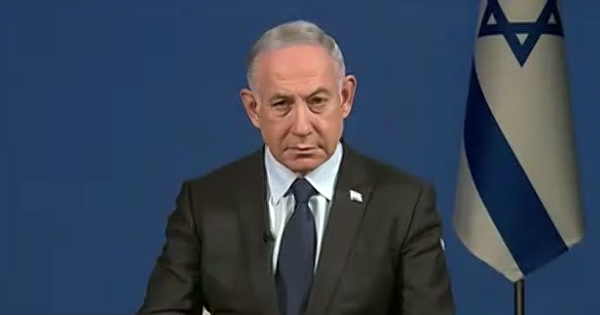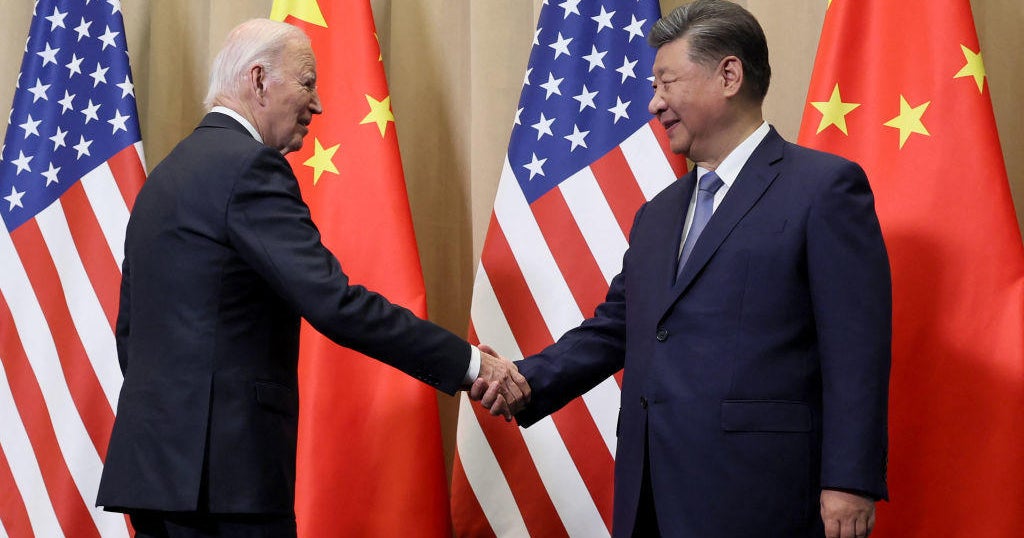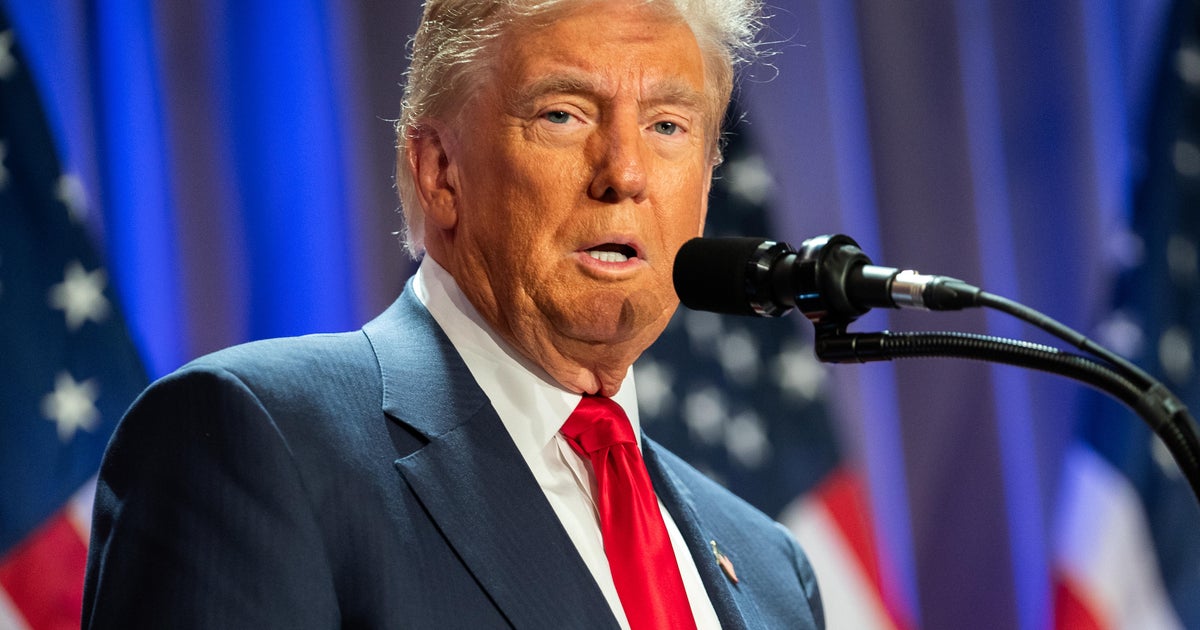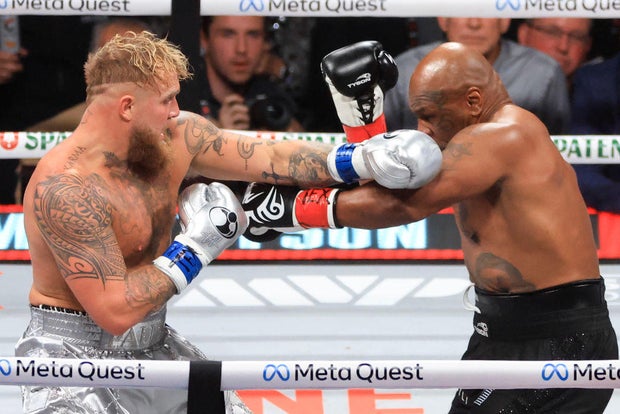CBS News
Transcript: Israeli Prime Minister Benjamin Netanyahu on “Face the Nation,” Feb. 25, 2024

The following is a transcript of an interview with Israeli Prime Minister Benjamin Netanyahu that aired on Feb. 25, 2024.
MARGARET BRENNAN: We turn now to the crisis in the Middle East and the war between Israel and Hamas. Joining us from Tel Aviv is Israeli Prime Minister Benjamin Netanyahu. Welcome back to “Face The Nation”, sir.
PRIME MINISTER BENJAMIN NETANYAHU: Thank you. Good to be with you.
MARGARET BRENNAN: Mr. Prime Minister, the US is working on a hostage deal that President Biden has said would bring with it at least six weeks of calm. The intelligence chiefs met on Friday. Are we close to a deal?
PRIME MINISTER BENJAMIN NETANYAHU: Well, I’m not sure the exact duration, but I can tell you that we’re all working on it. We want it, I want it. Because we want to liberate the remaining hostages, we’ve already brought half of them back. And I appreciate the effort, the combined effort of Israel, the United States, to bring back the remaining hostages. I can’t tell you if we’ll have it. But if Hamas goes down from its delusional claims and goes down- can bring them down to earth, then we’ll have the progress that we all want.
MARGARET BRENNAN: What specifically is holding up the deal at this point? It- reportedly, this would have 30 to 40 hostages, women, elderly, wounded, released in exchange for a few hundred Palestinian prisoners being released.
PRIME MINISTER BENJAMIN NETANYAHU:I don’t think it makes any sense to have a public discussion of this. But Hamas started out with just crazy demands. And, you know, it’s- it’s too soon to say if they’re- if they’ve abandoned them, but if they do abandon them and get into what you call the ballpark, they’re not even in the city. They’re in another planet. But if they come down to a- a reasonable situation, then yes, we’ll have a hostage deal. I hope so.
MARGARET BRENNAN: There are at least six U.S. citizens among those being held by Hamas. For you, is the return of living hostages necessary and essential for you to declare victory in this war?
PRIME MINISTER BENJAMIN NETANYAHU:Yes, we set- I’ve set three war goals. The first is to release the hostages. The second is to destroy Hamas. And the third is to ensure that Gaza does not pose a threat to Israel in the future. And obviously, the three are intertwined. They, they’re achieved, basically by our very effective and often heroic military operation. And also by tough negotiations, we’re combining the two and I hope it- it yields a result, but understand that unless we have total victory, we can’t have peace. We can’t leave Hamas in place. We can’t leave a quarter of Hamas battalions in Rafah and say, well, that’s- that’s fine, they’ll be there. It’s like saying a quarter of ISIS will be left and with a defined territory, because you know, they will reconstitute themselves immediately. So total victory is important to achieve the war goal of destroying Hamas, releasing the hostages, and ensuring that Gaza doesn’t pose a threat. But I think also is essential for any future peaceful Middle East.
MARGARET BRENNAN: Sure but on the issue of–
PRIME MINISTER BENJAMIN NETANYAHU: –and the defeat of the Iran terror axis.
MARGARET BRENNAN: On the issue of the hostages, as you know, time is of the essence here. So if this deal happens, and there are six weeks of calm that go with it, does that provide an opening to end this war? Or will you still go into southern Gaza, into Rafah regardless?
PRIME MINISTER BENJAMIN NETANYAHU: Yeah, well, victory is within reach, and you can’t have victory until you eliminate Hamas.
MARGARET BRENNAN: How within reach?
PRIME MINISTER BENJAMIN NETANYAHU: Hamas is a terrorist organization that- once we begin the Rafah operation, the intense phase of the fighting is weeks away from completion, not months, weeks away from completion. And that is- we’ve already destroyed 18 of the 24 Hamas terrorist battalions. So we- we have– and four of them are concentrated in the Rafah. We can’t leave the last Hamas stronghold without taking care of it, obviously, we have to do it. But understand, too, that I’ve asked the army to submit to me a double plan, first to evacuate to enable the evacuation of the Palestinian civilians in Gaza, and, obviously, second, to destroy the remaining Hamas battalions. That gets us a real, real distance towards the completion of our victory, and that- we’re not going to give it up. If we have a deal, it’ll be delayed somewhat. But it’ll happen. If we don’t have a deal, we’ll do it anyway. It has to be done. Because total victory is our goal, and total victory is within reach. Not months away, weeks away once we begin the operation.
MARGARET BRENNAN: Well, the White House says they need to see a credible and executable plan to protect civilians and the 1.4 million people who are sheltering in southern Gaza. This morning, the White House says they still have not seen such a plan, and no major military operation should proceed without it. Have you approved the plans that you’ve said you’ve asked for?
PRIME MINISTER BENJAMIN NETANYAHU: Actually, Margaret, I’m going from here to a meeting with the General Staff where they’re going to show me this dual plan.
MARGARET BRENNAN: Okay.
PRIME MINISTER BENJAMIN NETANYAHU: A plan to evacuate, and a plan to dismantle those remaining battalions. So yes, we– by the way we agree on this. I mean, we don’t have to be (indistinguishable). We’re on the same page with the U.S. on this, because that’s how we do it. The reason you have that population in Rafah is because we actually cleared them away from the other places, the zones, combat zones that we had, that’s why they’re there. So now there’s room for them to go north of Rafah, to the places that we’ve already finished fighting in.
MARGARET BRENNAN: That’s where you’re gonna move–
PRIME MINISTER BENJAMIN NETANYAHU: –that’s basically what we’re gonna do–
MARGARET BRENNAN: That’s the plan?
PRIME MINISTER BENJAMIN NETANYAHU: Yes.
MARGARET BRENNAN: To move 1.4 million people into northern Gaza? Can you guarantee that the IDF will not push–
PRIME MINISTER BENJAMIN NETANYAHU: I didn’t say northern Gaza, I said–
MARGARET BRENNAN: –will not– sorry. Go ahead.
PRIME MINISTER BENJAMIN NETANYAHU: I said north of Rafah.
MARGARET BRENNAN: Okay.
PRIME MINISTER BENJAMIN NETANYAHU: I said north of Rafah. In the northern part of the Gaza Strip, we still have fighting going on.
MARGARET BRENNAN: Right.
PRIME MINISTER BENJAMIN NETANYAHU: But we- we are– that is important. It’s important to understand, moving civilians out of an area that is going to be a combat zone is not a bad thing. It’s a good thing.
MARGARET BRENNAN: Sure.
PRIME MINISTER BENJAMIN NETANYAHU: And that’s what Israel is going to do.
MARGARET BRENNAN: Understood but the IDF, can you guarantee that they won’t push Palestinians out of Gaza and into Egypt? As you know, Egyptian officials have said, if you do that, you are putting at risk 46 years of peace.
PRIME MINISTER BENJAMIN NETANYAHU: Look, I think that the Egyptians know very well, that that’s not our purpose. And that won’t be the result. And we’re coordinating. We’re talking to the Egyptians all the time. So that’s not, I don’t think that’s an issue. The peace between Israel and Egypt to serve the interests of both countries, and will continue to serve the interests of both countries, I don’t think it’s in any danger.
MARGARET BRENNAN: You said that victory is with reach– within reach. But U.S. Intel says the IDF has only destroyed 30% of Hamas leadership, and that the amount of tunnels that Hamas uses have really only been tiny in terms of what has been destroyed by the IDF.
MARGARET BRENNAN: There is growing distrust–
PRIME MINISTER BENJAMIN NETANYAHU: Well–
MARGARET BRENNAN: –of you personally, sir, you know this, in the U.S. Congress and within the Biden White House. When your closest ally is telling you things like this, and telling you that you need to reconsider a strategy, isn’t it worth considering?
PRIME MINISTER BENJAMIN NETANYAHU: Look, I- I think that the U.S. is- agrees with us on the goal of destroying Hamas–
MARGARET BRENNAN: Yes.
PRIME MINISTER BENJAMIN NETANYAHU: And on the goal of releasing the hostages. The decisions of how to do that are left with us, and with me and the elected cabinet of Israel. And we’re doing that. A lot of things that the U- that we were told by the best of friends initially, turned out not to be true. They said you can’t enter the- the ground war without having enormous complications. They said you cannot fight, you can’t enter Gaza City, you can’t go into the tunnels, it will be a terrible bloodbath. All of that turned out to be not true. Our soldiers are in the tunnel network. We don’t have to take apart hundreds of kilometers of tunnels, we are taking apart the missile production factories that are underground, the command and control headquarters, the computers that are there, the money that is there, the weapons that are there, and the ammos that- that is there. We’re doing that methodically. So we’re- we’re doing the war- you can’t substitute for the Israeli military command. And we’re doing it very responsibly. The- John Spencer, who’s the head of urban warfare at West Point, says that no other army has gone to the lengths that Israel’s army has gone to clear civilians out of harm’s way, even though Hamas–
(CROSSTALK)
MARGARET BRENNAN: Sure–
PRIME MINISTER BENJAMIN NETANYAHU: –is doing everything to keep them in harm’s way. We respect our American–
(END CROSSTALK)
MARGARET BRENNAN: Sure, but the former head of Central Command was on this program just a few weeks ago and said, basically, you have not articulated any specific end game here. So- but putting that aside, I want to come back to a few different things you said–
PRIME MINISTER BENJAMIN NETANYAHU: Wait- wait- wait a minute Margaret, Margaret, hold on, you- you lob these- these grenades at me and you keep on moving. Well, first of all, you say, there’s no confidence me? Well, the Israeli public has confidence in me. Last week–
(CROSSTALK)
MARGARET BRENNAN: There were massive protests throughout Israel yesterday.
(END CROSSTALK)
PRIME MINISTER BENJAMIN NETANYAHU: The Knesset voted overwhelmingly- of course, we have protests. We- we have protests, Israel is a democracy that protests for 30 years. But the Israeli people are united as never before. Last week, they voted 99 to nine in the Knesset for my proposal that says that the way- that we have to do two things, we have to win the war, have total victory, but also not have an international dictate of a Palestinian state on it- shoved down our throats that would endanger Israel, but people are overwhelmingly united on this. When is the last time we had 99 votes in the Knesset?
MARGARET BRENNAN: Yeah.
PRIME MINISTER BENJAMIN NETANYAHU: I’ll tell you, 30 years ago.
MARGARET BRENNAN: Yeah.
PRIME MINISTER BENJAMIN NETANYAHU: So the people are united. The policy is right, the people support it. And I intend to take it to completion because that’s what we have. We can’t compromise with total victory, because I’ll tell you, we can’t win the peace if we don’t win the war, and we will win this war.
MARGARET BRENNAN: One of the members of the Knesset, the former Israeli Prime Minister Yair Lapid said he asked the Americans about what you just said about a unilateral declaration of recognition Palestinian state and he said, “You invented a threat that doesn’t exist. . . There is not one official in the world that suggested unilateral recognition of the Palestinians.” So, putting that aside, I want to–
PRIME MINISTER BENJAMIN NETANYAHU: Well, actually, the foreign– actually, the foreign secretary of Britain just spoke about it. There have been many–
MARGARET BRENNAN: Well, this was the U.S.
PRIME MINISTER BENJAMIN NETANYAHU: I hope that’s true.
MARGARET BRENNAN: Okay.
PRIME MINISTER BENJAMIN NETANYAHU: We’ve heard- we’ve heard a lot of briefings coming from- from the U.S. to that effect. So I hope it’s true. And if it’s true, then- then that will reinforce the decision made by the government- by the people of Israel, through their elected representative. And by the way, if people try to foist it on us, it will be a terrible mistake, because it would be seen as a reward for terror, after the most atrocious attack committed against the Jewish people since the Holocaust. So- people of Israel are not going to buy it. And- and if you want peace, you shouldn’t go that route. Peace will be achieved through direct negotiations between the parties down the line, I don’t think the Palestinians are ready for it. But when they are, that’s the way it will be achieved, not by international fiat.
MARGARET BRENNAN: I want to come back to something you said where you were raising questions about US intelligence and advice to you from the Biden administration, where you said it was wrong. You also said there was no bloodbath–
9:16:21
PRIME MINISTER BENJAMIN NETANYAHU: I didn’t say it was wrong, I said- I said some good friends gave us advice. It turned out to be that we performed a lot better than they anticipated. And by the way, we performed a lot better than we anticipated.
MARGARET BRENNAN: Well, on the no bloodbath, Doctors Without Borders went to the UN this week and said the civilian toll in Gaza is so high, they came up with a new term: wounded child, no surviving family. Save the Children says there are over 1000 children who have lost a limb over these past days since the beginning of the October 7 war. What Hamas has done is horrific. But President Biden has said your actions, Sir, are are “over the top.” Aren’t you concerned that Israel is creating more terrorists than it is killing?
9:17:13
PRIME MINISTER BENJAMIN NETANYAHU: I- I think that any civilian casualty is a tragedy. And I don’t say that halfheartedly. I lost a brother in war, I myself was wounded while releasing hostages from a kidnap- from a hijacked plane. I’ve lost friends in battle. I- I know what it means to lose friends and what it means to lose family members. So I- we don’t have an argument there. But this war has been forced upon us by a cynical enemy that not only targets our civilians, has raped, beheaded, burnt babies alive, killed children in front of their parents and parents in front of their children. This enemy not only targets civilians, but hides behind civilians, Palestinian civilians, so they’re committing a double war crime. I have to come back and say that in terms of the- the way this battle is fought, there is no parallel to the difficulty that we face. And John Spencer, the head of urban warfare at West Point, says that no other army has faced such a task. He- he gives one comparison–
MARGARET BRENNAN: Yeah, that’s not the question I asked, though.
PRIME MINISTER BENJAMIN NETANYAHU: –he gives Mosul as a comparison. Well, it is, but it- that’s the answer. You can’t say, oh, you- you give immunity to the terrorists because they’re hiding amongst civilians and forcing civilians not to leave. So what do you do? You say, okay, we’ll give you immunity? Hamas survives, will live to fight another- to commit another massacre and another massacre? What would America do? What would America do, Margaret, if you faced the equivalent of 20 9/11s, 50,000 Americans slaughtered in one day, 10,000 Americans, including mothers and children held hostage? Would you not be doing what Israel is doing? You’d be doing a hell of a lot more. And all Americans that I talk to, nearly all, say that. So Israel has gone to extraordinary lengths, calling up people, civilians, Palestinians in Gaza, telling them leave your home, sending pamphlets, we have done that effort, Hamas tries to keep them at gunpoint, we’ll clear them out of harm’s way, we’ll complete the job and achieve total victory, which is necessary to give a secure future for Israel, a better future for Gaza, a better future for the Middle East, and a setback for the Iran terror axis. That’s in all our interests. It’s in America’s interest too.
MARGARET BRENNAN: Mr. Prime Minister, I’m told we are out of time. “Face the Nation” will be back in one minute. We hope you’ll stay with us.
CBS News
Mike Tyson says he has “no regrets” after losing boxing match to Jake Paul

Despite losing his boxing match to Jake Paul, Mike Tyson in a social media post Saturday said he had “no regrets” to getting “in ring one last time.”
The boxing legend was defeated by social media star Jake Paul in a highly anticipated fight on Friday night with an age difference of over three decades between the two contenders.
Netflix said Saturday that 60 million households worldwide tuned in to watch the match. The two fighters went eight full rounds, with each round two minutes long. Paul defeated Tyson by unanimous decision and the 27-year-old upset boxer and 58-year-old former heavyweight champion hugged afterward.
Paul was expected to earn about $40 million from the fight, and Tyson was expected to take around $20 million for the fight, according to DraftKings and other online reports.
Getty Images
Tyson said on his social media that “this is one of those situations when you lost but still won. I’m grateful for last night.”
The fight almost didn’t happen after Tyson experienced an ulcer flare-up while on a plane in March. He addressed his illness Saturday, writing that he “almost died in June.” He said he had eight blood transfusions and “lost half my blood and 25lbs in hospital and had to fight to get healthy to fight so I won.”
Tyson retired from boxing in 2005 after a 20-year career. He last fought in a 2020 exhibition match against former four-division world champ Roy Jones Jr.
“To have my children see me stand toe to toe and finish 8 rounds with a talented fighter half my age in front of a packed Dallas Cowboy stadium is an experience that no man has the right to ask for. Thank you,” he said.
Alex Sundby and
contributed to this report.
CBS News
In their final meeting, Xi tells Biden he is “ready to work with a new administration”

In their final meeting, China’s leader Xi Jinping told U.S. President Biden that his nation was “ready to work with a new administration,” as President-elect Donald Trump prepares to take over.
The two leaders gathered Saturday on the sidelines of the annual Asia-Pacific Economic Cooperation summit. Mr. Biden was expected to urge Xi to dissuade North Korea from further deepening its support for Russia’s war on Ukraine. It marked their first in-person meeting since they met in Northern California last November.
Without mentioning Trump’s name, Xi appeared to signal his concern that the incoming president’s protectionist rhetoric on the campaign trail could send the U.S.-China relationship into another valley.
“China is ready to work with a new U.S. administration to maintain communication, expand cooperation and manage differences so as to strive for a steady transition of the China-U.S. relationship for the benefit of the two peoples,” Xi said through an interpreter.
LEAH MILLIS/POOL/AFP via Getty Images
Mr. Biden, meanwhile, spoke in broader brushstrokes about where the relationship has gone and reflected not just on the past four years, but on their long relationship.
“Over the past four years, China-U.S. relations have experienced ups and downs, but with the two of us at the helm, we have also engaged in fruitful dialogues and cooperation, and generally achieved stability,” he said.
Mr. Biden and Xi, with top aides surrounding them, gathered around a long rectangle of tables in an expansive conference room at Lima’s Defines Hotel and Conference Center.
There’s much uncertainty about what lies ahead in the U.S.-China relationship under Trump, who campaigned promising to levy 60% tariffs on Chinese imports.
Bobby Djavaheri, president of Los Angeles-based Yedi Houseware Appliances — which manufactures its products in China — told CBS News in an interview this week that such tariffs “would decimate our business, but not only our business. It would decimate all small businesses that rely on importing.”
Trump has also proposed revoking China’s Most Favored Nation trade status, phasing out all imports of essential goods from China and banning China from buying U.S. farmland.
Already, many American companies, including Nike and eyewear retailer Warby Parker, have been diversifying their sourcing away from China. Shoe brand Steve Madden says it plans to cut imports from China by as much as 45% next year.
White House national security adviser Jake Sullivan said Biden administration officials will advise the Trump team that managing the intense competition with Beijing will likely be the most significant foreign policy challenge they will face.
It’s a big moment for Mr. Biden as he wraps up more than 50 years in politics. He saw his relationship with Xi as among the most consequential on the international stage and put much effort into cultivating that relationship.
Mr. Biden and Xi first got to know each other on travels across the U.S. and China when both were vice presidents, interactions that both have said left a lasting impression.
“For over a decade, you and I have spent many hours together, both here and in China and in between. And I think we’ve spent a long time dealing with these issues,” Mr. Biden said Saturday.
But the last four years have presented a steady stream of difficult moments.
The FBI this week offered new details of a federal investigation into Chinese government efforts to hack into U.S. telecommunications networks. The initial findings have revealed a “broad and significant” cyberespionage campaign aimed at stealing information from Americans who work in government and politics.
U.S. intelligence officials also have assessed China has surged sales to Russia of machine tools, microelectronics and other technology that Moscow is using to produce missiles, tanks, aircraft and other weaponry for use in its war against Ukraine.
And tensions flared last year after Mr. Biden ordered the shooting down of a Chinese spy balloon that traversed the United States.
CBS News
Trump selects Liberty Energy CEO Chris Wright as secretary of Energy

President-elect Donald Trump has selected Chris Wright, a campaign donor and fossil fuel executive, to serve as energy secretary in his upcoming, second administration.
CEO of Denver-based Liberty Energy, Wright is a vocal advocate of oil and gas development, including fracking, a key pillar of Trump’s quest to achieve U.S. “energy dominance” in the global market.
Trump also said in a statement Saturday that Wright will serve on the newly-created National Energy Council, which will be chaired by North Dakota Gov. Doug Burgum, Trump’s selection for secretary of the Interior.
Burgum will oversee a panel that crosses all executive branch agencies involved in energy permitting, production, generation, distribution, regulation and transportation, Trump said in a previous statement.
Wright has been one of the industry’s loudest voices against efforts to fight climate change and could give fossil fuels a boost, including quick action to end a year-long pause on natural gas export approvals by the Biden administration.
Wright also has criticized what he calls a “top-down” approach to climate by liberal and left-wing groups and said the climate movement around the world is “collapsing under its own weight.”
Consideration of Wright to head the administration’s energy department won support from influential conservatives, including oil and gas tycoon Harold Hamm.
Hamm, executive chairman of Oklahoma-based Continental Resources, a major shale oil company, is a longtime Trump supporter and adviser who played a key role on energy issues in Trump’s first term.
Hamm helped organize an event at Trump’s Mar-a-Lago resort in April where Trump reportedly asked industry leaders and lobbyists to donate $1 billion to Trump’s campaign, with the expectation that Trump would curtail environmental regulations if re-elected.
The Energy Department is responsible for advancing energy, environmental and nuclear security of the United States. The agency is in charge of maintaining the country’s nuclear weapons, oversees 17 national research laboratories and approves natural gas exports, as well as ensuring environmental cleanup of the nation’s nuclear weapons complex. It also promotes scientific and technological research.
Republican Sen. John Barrasso, who is expected to become chairman of the Senate Energy and Natural Resources Committee, said Trump promised bold choices for his Cabinet, and Wright’s nomination delivers.
“He’s s an energy innovator who laid the foundation for America’s fracking boom. After four years of America last energy policy, our country is desperate for a secretary (of energy) who understands how important American energy is to our economy and our national security,″ Barrasso said of Wright, adding: “Wright will help ensure America remains committed to an all-of-the-above energy policy that puts American families first.”
Thomas Pyle, president of the American Energy Alliance, a conservative group that supports fossil fuels, said Wright would be “an excellent choice” for Energy secretary. Pyle led Trump’s Energy Department’s transition team in 2016.
Liberty is a major energy industry service provider, with a focus on technology. Wright, who grew up in Colorado, earned undergraduate degree at MIT and did graduate work in electrical engineering at the University of California-Berkeley and MIT. In 1992, he founded Pinnacle Technologies, which helped launch commercial shale gas production through hydraulic fracturing, or fracking.
He later served as chairman of Stroud Energy, an early shale gas producer, before founding Liberty Resources in 2010.











